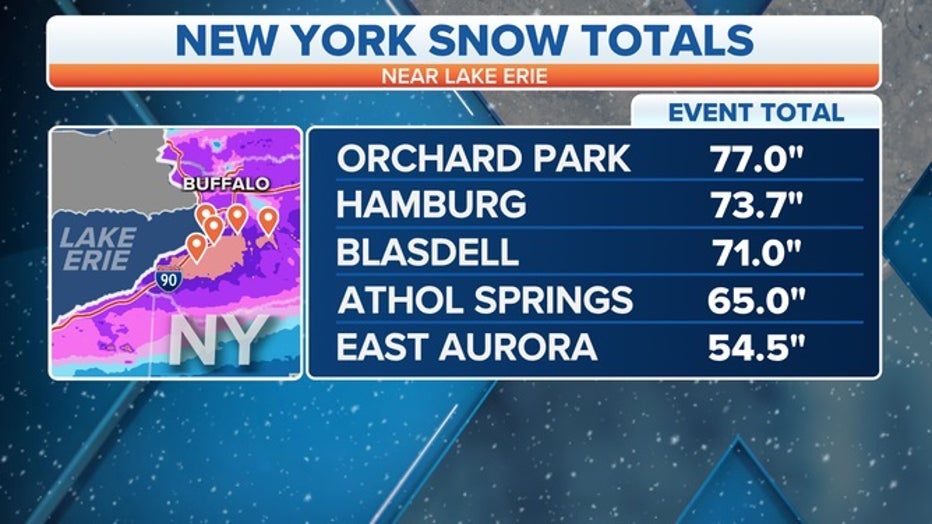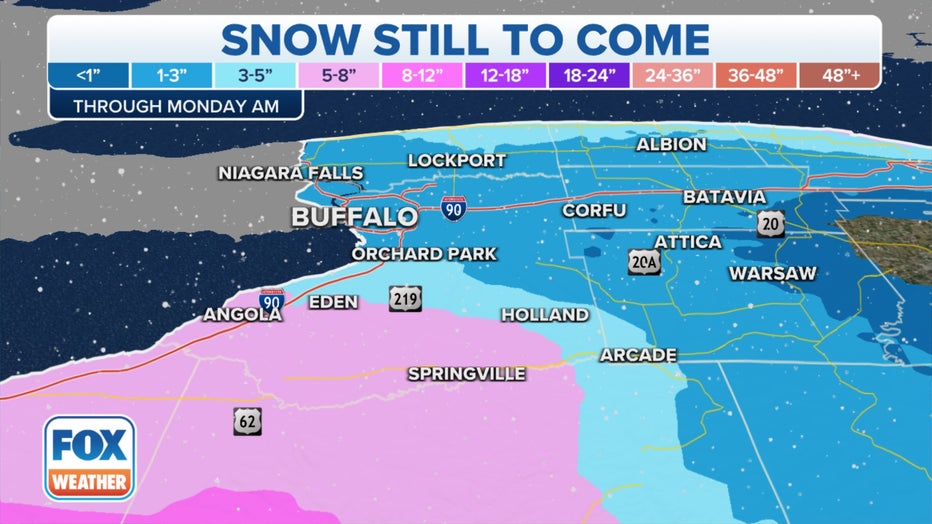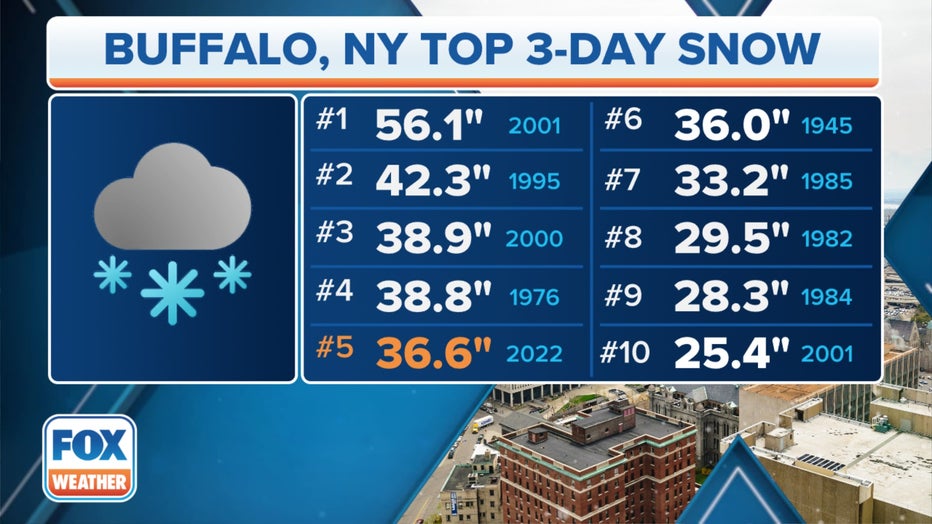NY governor requests federal emergency declaration after historic snowstorm
New York governor requests federal emergency declaration over snowstorm
New York Gov. Kathy Hochul gives an update on Sunday, Nov. 20, amid a historic snowstorm in western NY that brought more than 6 feet of snow to some places.
A long-duration lake-effect snowstorm that's underway in western and northern New York, including the cities of Buffalo and Watertown, will begin to wind down on Sunday and Monday after dropping several feet of snow across the region.
Bands of heavy snow off lakes Erie and Ontario have been producing snowfall rates up to 3 inches per hour since Thursday, vaulting storm totals more than 50 inches. Many vehicles attempting to drive around the Buffalo metro area were reported to get stuck on Friday because of impassable roads.
As of Sunday, 77 inches (nearly 6.5 feet) of snow has buried Orchard Park, New York, where the Buffalo Bills were originally scheduled to host the Cleveland Browns at Highmark Stadium on Sunday, but the game has been moved to Ford Field in Detroit because of the historic snowstorm.

As of Sunday morning, 77 inches (nearly 6.5 feet) of snow has buried Orchard Park, New York. (FOX Weather)
New York Gov. Kathy Hochul declared a state of emergency for the Buffalo and Watertown areas because of the expected feet of snow. On Saturday, Hochul said she would submit a request to President Joe Biden for a federal Emergency Declaration for 11 counties in western and northern New York.
Once approved, Hochul said the Emergency Declaration would provide immediate federal funding to impacted counties to support ongoing response and rescue operations.
On Thursday evening, all commercial traffic was banned along a 132-mile stretch of the New York State Thruway (Interstate 90) from Rochester, New York, to the Pennsylvania border. I-90 was reopened to all traffic in both directions at Exit 46 to the Pennsylvania state line on Sunday morning, but commercial speed restrictions remain in effect.
HISTORIC LAKE-EFFECT SNOWSTORM CREATES WHITEOUT CONDITIONS IN WESTERN NEW YORK
A state of emergency has also been declared for Erie County, New York, home to the city of Buffalo. Southern portions of the city of Buffalo have been placed under a travel ban, while the remainder of the city remains under a travel advisory.
At least two deaths were attributed to the storm by an Erie County, New York official. The official said two residents passed away after suffering cardiac issues while trying to remove the snow and cautioned that the snow is heavy and can be dangerous.
Medical experts say shoveling heavy snow can be detrimental to one's health. A study by the American Journal of Emergency Medicine found that more than 11,000 people seek medical attention for injuries associated with removing snow each year.
Heaviest snow bands eye Buffalo, Watertown through Sunday
'Historic' snow storm leaves people stranded in Buffalo, New York
Dozens of abandoned cars can be found around the Buffalo area, as this 'historic' snowstorm continues. FOX Weather's Katie Byrne spoke live with LiveNOW from FOX's Josh Breslow.
The National Weather Service office in Buffalo noted the weather pattern responsible for this lake-effect snow event shares similarities with the historic November 2014 lake-effect storm that was dubbed "Snowvember," when more than 5 feet of snow crippled the Buffalo Southtowns.
A LOOK BACK ON BUFFALO'S HISTORIC 2014 ‘SNOWVEMBER’ STORMS THAT LEFT 7 FEET OF SNOW IN SOME SPOTS
Lake-Effect Snow Warnings have been issued on the east and northeast sides of lakes Erie and Ontario, including Jamestown, Oswego and Watertown.
WHY SNOWFALL RATE IS IMPORTANT TO UNDERSTANDING WINTER WEATHER

Additional snowfall forecast through Sunday. (FOX Weather)
Thundersnow has even been observed in the heaviest snow bands along the lakefront.
Lake-effect snow bands swung southward and intensified on Saturday night, producing snowfall rates of 2 to 3 inches per hour.
The bands will settle to the south of the Buffalo and Watertown metro areas during the day Sunday, bringing an end to the intense lake-effect snow for the most populated areas of the region, but an additional 6 to 12 inches of snowfall is predicted by Sunday evening for areas well south of both Buffalo and Watertown.
Snow showers will likely linger into Monday to the east of lakes Erie and Ontario with additional minor accumulations.
Buffalo Mayor speaks on Snowstorm
Buffalo Mayor speaks with LiveNOW from FOX's Josh Breslow in snowstorm.
When looking at U.S. cities with a population of at least 50,000 residents, Buffalo ranks as the fourth snowiest in the nation. It averages 95.4 inches of snow each winter – just shy of 8 feet.
THESE ARE THE 7 SNOWIEST CITIES IN THE U.S.
Buffalo's heaviest three-day snowstorm on record dumped a whopping 56.1 inches of snow in 2001.
While that all-time record is expected to remain safe, this event will likely become one of the city's top-10-heaviest snowstorms, as Niziol noted earlier.

The 10 heaviest three-day snowstorms on record in Buffalo. (FOX Weather)
How does lake-effect snow form?
What is 'lake effect snow?' Weather expert breaks it down!
What is 'lake effect snow?' Dr. Elizabeth Thomas with University at Buffalo spoke with LiveNOW from FOX's Josh Breslow to explain.
Lake-effect snow develops when cold, dry air, often originating from Canada, flows across the relatively warm waters of the Great Lakes.
As that cold air passes over the lakes, warmth and moisture from the water are picked up and transferred into the lowest portion of the Earth's atmosphere. This rising air condenses into clouds, which can grow into narrow bands that are capable of producing snowfall rates as high as 2 to 3 inches per hour or more, according to the NWS.
The temperatures of lakes Erie and Ontario currently range from the upper 40s to the lower 50s – much warmer than the temperatures in the 20s and 30s that are expected in western and northern New York during this lake-effect snowstorm.
This significant temperature difference will create intense bands of snow off lakes Erie and Ontario through this weekend.
In fact, Lake Ontario's temperature is at its warmest value for mid-November in at least 27 years of recordkeeping, according to an analysis from NOAA's Great Lakes Environmental Research Laboratory. Lake Erie's temperature is at its second-warmest value for mid-November over the same period of record.
LINK: Get updates and more on this story at foxweather.com.

